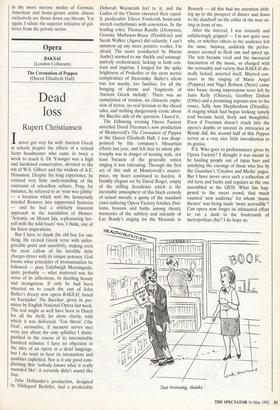Opera
BAIOUI (London Coliseum)
Dead loss
Rupert Christiansen
Inever got very far with Ancient Greek at school, despite the efforts of a retired Scots headmaster who came in twice a week to teach it. Dr Younger was a high and hardened conservative, devoted to the wit of W.S. Gilbert and the wisdom of A.E. Housman. Despite his long experience, he evinced very little understanding of the constants of schoolboy culture. Prep, for instance, he referred to as 'your wee jobbie'
— a locution which sent the lavatorially minded Remove into suppressed hysterics — and he had a similarly innocent approach to the translation of Homer: 'Artemis, on Mount Ida, a-pleasuring her- self with the wild boars' was, I think, one of his finest inspirations.
But I have to thank the old boy for one thing. He recited Greek verse with unfor- gettable point and sensitivity, making even the most callow of his horrible little charges shiver with its unique potency. God knows what principles of pronunciation he followed — pure Edinburgh Morningside, quite probably — what mattered was his sense of its inflections, its dazzling beauty and strangeness. If only he had been wheeled on to coach the cast of John Buller's dreary new opera BAIOCAI, based on Euripides' The Bacchae, given its pre- mière by English National Opera last week. The text might as well have been in Dutch for all the thrill, let alone clarity, with which it was delivered. 'Ton theon' ('the God', accusative, if memory serves me) were just about the only syllables I distin- guished in the course of its interminable hundred minutes. I have no objection to the idea of an opera in a dead language, but I do want to hear its intonations and qualities exploited. Nor is it any good com- plaining that 'nobody knows what it really sounded like': it certainly didn't sound like that.
Julia Hollander's production, designed by Hildegard Bechtler, had a predictable Deborah Warnerish feel to it, and the Ladies of the Chorus executed their equal- ly predictable Eileen Fowlerish bend-and- stretch eurhythmics with conviction. In the leading roles, Thomas Randle (Dionysus), Graeme Matheson-Bruce (Penthfeus) and Sarah Walker (Agave) did valiantly. I can't summon up any more positive verdict, I'm afraid. The score (conducted by Martin Andre) seemed to me thickly and unimagi- natively orchestrated, lacking in both con- trast and impetus. I longed for the spiky brightness of Prokofiev or the stern metric complexities of Stravinsky: Buller's idiom was too mushy, too familiar, for all the banging of drums and 'fragments of Ancient Greek melody'. There was no cumulation of tension, no climactic explo- sion of terror, no real lyricism in the choral odes, and nothing dangerously erotic about the Bacchic side of the question. I hated it.
The following evening Opera Factory unveiled David Freeman's new production of Monteverdi's The Coronation of Poppea at the Queen Elizabeth Hall. I was disap- pointed by this company's Mozartian efforts last year, and felt that its whole phi- losophy was in danger of turning stale, not least because of the generally rotten singing it was tolerating. Through the first act of this stab at Monteverdi's master- piece, my heart continued to harden. A blankly elegant set by David Roger, empty of the stifling decadence which is the inevitable atmosphere of this black comedy of sexual morals; a quota of the standard yawn-inducing Opera Factory fetishes (bot- toms, bosoms and baths among them); memories of the subtlety and intensity of Luc Bondy's staging for the Monnaie in Brussels — all this had my attention drift- ing up to the prospect of dinner and down to the dandruff on the collar of the man sit- ting in front of me.
After the interval, I was instantly and unfalteringly gripped — I'm not quite sure why, or whether others in the audience felt the same. Anyway, suddenly the perfor- mance seemed to flesh out and speed up. The text became vivid and the mercurial fascination of the music, so charged with the sensuality and variety that BAKXAI dis- mally lacked, asserted itself. Blurred con- tours in the singing of Marie Angel (Poppea) and Nigel Robson (Nero) came into focus; strong impressions were left by Janis Kelly (Ottavia), Geoffrey Dolton (Otho) and a promising soprano new to the roster, Sally Ann Shepherdson (Drusilla). A staging which had begun looking tamely trad became lucid, lively and thoughtful. Even if Freeman doesn't reach into the opera's depths or unravel its intricacies as Bondy did, the second half of this Poppea serves as a very nice little introduction to its genius.
P.S. Who goes to performances given by Opera Factory? I thought it was meant to be hauling people out of tapas bars and satisfying the cravings of those who live by the Guardian's 'Creative and Media' pages. But I have never seen such a collection of old farts and hacks and regulars as the one assembled at the QEH. What has hap- pened to the smart crowd, that much vaunted 'new audience' for whom 'music theatre' was being made 'more accessible'? Can opera now forget its infatuated effort to cut a dash in the boulevards of metropolitan chic? I do hope so.
'Just browsing, thanks.'


















































 Previous page
Previous page